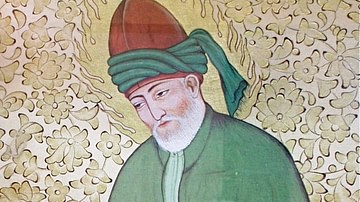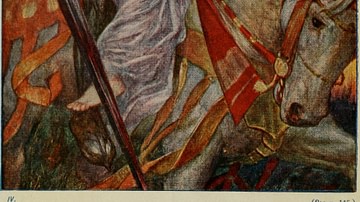Search
Search Results

Definition
Charon - The Ferryman to the Dead in Greek Mythology
Charon is a figure from Greek mythology where he is the boatman who ferries the souls of the dead across the waters of Hades to the judgement which will determine their final resting place. The Greeks believed the dead needed a coin to pay...

Definition
Temple at Uppsala
The Temple at Uppsala was a religious center dedicated to the Norse gods Thor, Odin, and Freyr located in what is now Gamla Uppsala in Sweden. It is described by the 11th-century historian Adam of Bremen as the most significant pagan site...

Definition
Rumi
Jalal ad-Din Muhammad Rumi (also given as Jalal ad-did Muhammad Balkhi, best known as Rumi, l. 1207-1273 CE) was a Persian Islamic theologian and scholar but became famous as a mystical poet whose work focuses on the opportunity for a meaningful...

Definition
Heinrich Himmler
Heinrich Himmler (1900-1945) was the head of the Nazi SS (Schutzstaffel) organisation. One of the most powerful individuals in Nazi Germany, Himmler built up the SS from a small paramilitary unit to a vast organisation, which included armoured...

Definition
Seven Lucky Gods
In Japanese folklore the Shichifukujin are the Seven Lucky Gods who may also be known as the Seven Gods of Happiness or the Seven Gods of Good Fortune. The seven gods are in fact of diverse origin as some are originally from Buddhism, some...

Definition
Adonis
The myth of Adonis is a legendary love story that combines tragedy and death on the one hand, and the joy of coming back to life on the other. The story of the impossibly handsome Adonis and his lover the goddess Aphrodite originally dates...

Definition
Cernunnos - The Ancient Celtic Nature God
Cernunnos was an ancient Celtic god who represented nature, flora and fauna, and fertility. He is frequently depicted in Celtic art wearing stag antlers or horns and usually a torc around his neck. Few details are known about him but celebrated...

Definition
Guinevere
Guinevere is the Queen of Britain, wife of King Arthur, and lover of Sir Lancelot in the Arthurian Legends best known in their standardized form from Sir Thomas Malory's Le Morte D'Arthur (1469 CE). She first appears in Geoffrey of Monmouth's...

Definition
Druid
Druids were a class of individuals in ancient Celtic cultures known for their great wisdom and knowledge of traditions. Not only priests who managed all religious rituals such as sacrifices (including humans), druids were able to give practical...

Definition
Lancelot
Lancelot, also known as Sir Lancelot and Lancelot du Lac (“Lancelot of the Lake”) is the greatest knight of King Arthur's court and lover of Arthur's wife, Queen Guinevere, best known from Sir Thomas Malory's Le Morte D'Arthur (1469 CE...